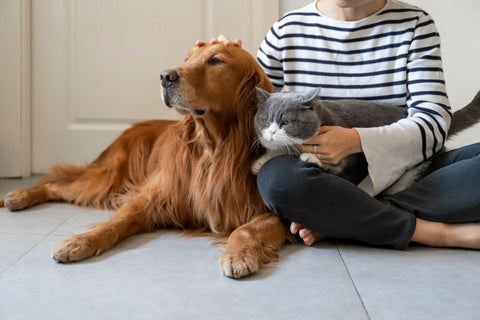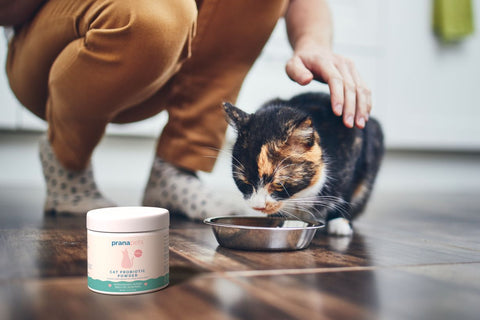

Key Highlights
-
A pet's immune system is a complex system that protects them from harmful foreign substances like bacteria and viruses.
-
Just like in humans, the immune system in dogs and cats is composed of white blood cells and organs located throughout the body.
-
Providing your pet with a well-balanced diet, regular exercise, and a stress-free environment can support their immune health.
-
Recognizing the signs of a weakened immune system, such as frequent infections or slow wound healing, is crucial for early intervention.
-
Regular veterinary checkups, including blood tests, can help monitor your pet's immune system and catch any potential issues.
Introduction
A healthy immune system is very important for your pet's overall health. This complex system of cells, tissues, and organs works hard to fight off harmful invaders, including bacteria and fungi. When there are threats, it starts a strong immune response. It is essential for every pet owner to understand the basics of the immune system and how to help keep it functioning well.
Understanding the Immune Systems of Dogs and Cats
The immune systems of dogs and cats are similar to ours. However, they also have some unique features.
Both dogs and cats have a complex defense system. This system has special cells and organs all over their bodies. These parts work together to find and tackle potential dangers. Immune cells are made in the bone marrow. Then, they travel to the lymph nodes and spleen, where they filter out harmful things. Each part is important for the immune system to work well.
The Role of White Blood Cells
White blood cells are the main defense team of your body. They start their journey in the bone marrow. Then, they move out to patrol the bloodstream and tissues. They are always ready to fight infections and diseases.
These immune cells are very diverse. Each type of white blood cell has a special job to target specific threats. For example, neutrophils are like first responders. They quickly reach the scene and eat up bacteria that invade the body.
Lymphocytes, on the other hand, remember past invaders. This helps the immune system to respond faster and better if the same threat comes back again.
Innate vs. Adaptive Immune Response
When a foreign invader enters a pet's body, the immune response has two main parts. The first part is the innate immune response. This is the first line of defense. It reacts quickly but does not target specific threats, differentiating between the invaders and the body’s own cells. It works to neutralize many types of dangers. This response uses barriers like skin and mucous membranes. It also uses special cells that eat up and destroy invaders.
If the innate response is not enough, the adaptive immune response reacts next. This system takes a bit longer to start working but focuses on specific invaders.
This ability to adapt helps the immune system "remember" past encounters with invaders. This means it can respond faster and better the next time. This is how vaccinations work; they prepare the adaptive immune system to recognize and fight specific diseases.
Key Factors Influencing Pet Immune Health
Maintaining a strong immune system is important for the health of both cats and dogs. Here are some key factors to consider:
-
Give them a healthy diet.
-
Make sure they get enough exercise.
-
Manage their stress levels.
-
Stick to a regular vaccination schedule.
Impact of Nutrition on Immune Function
A good and healthy diet for dogs is important for keeping their immune system strong. Just like people, pets need many nutrients to stay healthy, and their immune system needs special care too.
Essential fatty acids, especially omega-3, help immune cells work well. They also help decrease inflammation in the body. High-quality protein is needed to make antibodies and other parts of the immune system. Vitamins and minerals, like vitamins A, C, E, and zinc, protect cells from damage and help the immune function.
-
Enough protein is important to make antibodies and support the growth of immune cells.
-
Essential fatty acids, especially omega-3s, help the body manage inflammation and improve communication among immune cells.
-
Antioxidants, such as vitamins C and E, fight off harmful molecules that can hurt cells and weaken the immune system.
Natural Immune Boosting Supplements
There are many natural remedies that help support your pet's immune health. When shopping for a natural immunity supplement for dogs or cats, look for ingredients like echinacea, astragalus, and colostrum. These ingredients have been shown to enhance the immune system in pets by promoting the production of white blood cells and antibodies. Additionally, probiotics found in our Cat Probiotic Powder can help maintain a healthy balance of gut bacteria, which is crucial for a strong immune system.
articlebanners1
Regular Exercise and Stress Management
Regular exercise is good for a pet’s health. It also helps their immune system. Research shows that moderate exercise can improve how immune cells work and increase blood flow. This makes it easier for their bodies to fight infections.
On the other hand, long-term stress can hurt a pet's immune system. When a pet feels stressed for too long, their body makes cortisol. This hormone can lower immune function and make pets more likely to get sick.
It is important to have a calm environment to keep the immune system strong.
-
Playtime and fun games can help lower stress and make pets relax.
-
A safe and comfy living area with enough space to rest is needed.
-
If needed, think about using pheromone diffusers or calming supplements to help reduce anxiety.
Recognizing Signs of Immune System Issues in Pets
As a pet owner, you should watch for signs that your pet’s immune system may be weak.
Signs to look for include:
-
Frequent infections, like ear infections or skin problems
-
Trouble breathing
-
Wounds that heal slowly
-
Ongoing diarrhea or vomiting
-
Low energy
-
Loss of appetite
-
Weight loss
Common Symptoms of Immune Deficiencies in Dogs and Cats
Immune deficiencies are problems that make it hard for the immune system to fight off infections and diseases. These issues can be something you're born with (primary) or they can develop as you grow older (secondary).
In dogs and cats, symptoms of immune deficiencies can show up in different ways. This often depends on what causes them and which parts of the immune system are affected.
Common signs of a weak immune system include:
-
Recurrent infections: Getting infections often, like ear infections, skin problems, or respiratory infections, is a major sign of an immune deficiency.
-
Slow wound healing: If wounds take a long time to heal or get infected quickly, it might mean the immune response is not working well.
-
Digestive issues: Ongoing diarrhea, vomiting, or weight loss can mean there’s a problem with the immune system, especially if linked to inflammation or issues with digestion.
When to Seek Veterinary Care
Regular checkups with your vet are very important. They help keep an eye on your pet's immune health and find any problems early. During the visits, the vet will give your pet a physical exam, check their vaccinations, and might suggest blood tests. These tests, like a complete blood count (CBC) or blood chemistry panel, can tell a lot about your pet's immune system function and overall health.
If your pet shows signs of a weak immune system or has frequent infections, it's important to see the vet quickly. The vet may recommend extra tests, such as specific antibody titers or immune function assays. These tests help figure out what is causing the immune system problems and how to treat them.
Finding issues early and getting treatment fast is very important. It helps manage immune deficiencies and improves your pet's overall health and quality of life.
In conclusion, it is important to understand and support your pet's immune health. This helps keep them healthy overall. Good nutrition, regular exercise, and managing stress are key for a strong immune system. Spotting signs of weak immunity early and getting veterinary care is very important for your pet's health. You can also boost your pet's immunity by using natural remedies and keeping up with vaccinations. A healthy immune system is essential for a happy and active life for your beloved dogs and cats.
Frequently Asked Questions
What natural remedies can support my pet’s immune system?
Supporting your pet's immune system naturally can be done by adding probiotics to their food. Probiotics help keep gut bacteria healthy, which is important for immunity. You should also include colorful fruits and vegetables in their diet. These foods are rich in antioxidants that can fight damage from free radicals and strengthen their defenses.
How do vaccinations influence my pet's immunity?
Vaccinations give a safe version of a certain antigen. This helps the immune system to make antibodies without making your pet sick. It also helps the body remember the antigen. If your pet meets that antigen again, their body can respond quickly and effectively. This prevents them from getting sick.
articlebanners2




